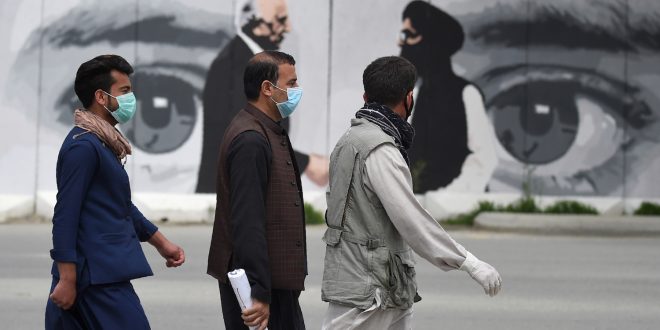By Farid Tavos
Unemployment of citizens who depend upon daily wages in Afghanistan has pushed them to the point at which they are turning to domestic violence as an escape from their miserable circumstances.
As the coronavirus cases are exacerbating throughout the world, the lockdown periods are being extended to control the outbreak of the virus. Afghanistan, on account of the raging Covid-19 positive cases, is no exception to the lockdown.
After the first recorded Coronavirus case in the country on February 24, 2020, the government took the initiative measures to control the virus. Nevertheless, with 17 267 confirmed cases and 294 deaths as of June 3, 2020, the virus has spread rapidly in the country.
The country encountered a complete lockdown in late March 2020. Because the novel coronavirus cases are nowhere near under control, Wahidullah Mayar, the Afghan Public Health Ministry Spokesman, has announced a further two to three-week lockdown extension.
Any insightful individual is able to discern that this extension will only worsen the already miserable situation of the country. Being the underdeveloped country that Afghanistan is, the pathetic circumstances of the lockdown can clearly be assumed.
On one hand, intercity trade, export, and border closures have devastated the country’s economy. The export of Agricultural products was one of the major businesses of the Afghan people, and as the lockdown proceeds and airspace is closed between Afghanistan and other countries, the export of goods has decreased considerably.
On the other hand, poor health care facilities, domestic violence, and unemployment have caused a shocking social downfall. Domestic violence cases, which are already prevalent in Afghanistan, have risen since the outbreak of the coronavirus.
With the return of Afghan national workers and laborers residing in Pakistan and Iran, the novel coronavirus cases are increasing in almost all the provinces. The understaffed healthcare system in Afghanistan is unable to control the virus eruption, even after imposing social distancing and cleanliness measures. It is believed that the reason for this health crisis is the lack of healthcare facilities and services.
The situation of hospitals and clinics are exceptionally low. Moreover, healthcare and paramedic staff are leaving their jobs due to the lack of precautionary measures available at the healthcare institutes, as they fear exposing themselves to the deadly virus.
Afghanistan’s economy, due to the warfare and Taliban controversies, has already been on the brink of collapse for decades, with almost 80% of its inhabitants living below the poverty line. This pandemic has worsened this situation, as six million daily wagers have lost their jobs in the last two months of lockdown.
The adversity doesn’t end here. Due to these employment and financial problems, thousands of Afghans, especially women and children, are trapped in extreme hunger. According to the UN, five million children are at risk for starvation. The World Food Program (WFP) declared the pandemic as a “hunger pandemic” instead of a coronavirus pandemic.
With bazaars being closed, shops and stores shut down, and local transport ceasing, many families are on the verge of facing extreme food scarcity, as the main earning members of society are daily workers that have already lost employment. During Ramadan, most of the families were on a twenty-four hour fast and there was no food available for the families.
Now, as the lockdown continues, people are still worried about being able to provide basic commodities for their families. People do not even have clean water available to drink, as the price of water canisters has risen to ten afghani.
The lack of trade and increased demand for food staples has risen an alarming extent. WFP reported on May 31, 2020 that the price of wheat flour has risen by 14% and 17% in major city markets. and cooking oil prices have shown a 24% increment while sugar, rice, and pulses had an increment of 10%. Afghan children will face extreme starvation in the upcoming days unless the international world steps up and takes the responsibility to supply at least the basic nutritional necessities.
The financial burden and crisis have affected the mental wellbeing of common Afghan men in unimaginable ways. It has pushed the Afghan people to extremes, where they are using child exploitation, domestic violence, and abuse as coping mechanisms of their unemployment and financial dilemmas, according to the emerging violence cases reported by the Head of Provincial Women Affairs Department.
The Head of Provincial Women’s Affairs Department claims that “One in fifty women in Afghanistan faces domestic (physical, emotional, sexual) violence,” but the percentage was still low before the lockdown.
Afghanistan was already below the poverty line before the coronavirus pandemic. Women were subjected to all kinds of domestic pressures by their men, Be it violence or household turmoil, life for women in Afghanistan was very difficult.
Afghan men were already dominating and controlling towards their women. Now, as they are home-bound 24/7, women are being tortured in new and unusual ways by the men, as reported by Reuters.
The worst case of domestic violence in Afghanistan surfaced recently when a man chopped off his wife’s nose when she asked for a divorce. Khoshboo Maidanwal, Head of Provincial Women’s Affairs Department reported that the abuse had come to a point in which the twenty-four-year-old woman had no option but to leave. As soon as she decided to file for a divorce, her husband beat her brutally and cut off her nose with a kitchen knife.
In another interview, Khoshboo added that during the lockdown, there has been a surge in women’s oppression cases. “We have dealt with various cases including forced child marriages, honor killings, mutilation, household turmoil and brutal beatings” she added.
In this scenario, the UN is supporting the Afghan government to minimize the socio-economic issues. The government should abide by the rules and regulations of the UN and the people at an individual level should be more considerate in order to effectively manage the depressing lockdown situation in the country.
 Afghanistan Times
Afghanistan Times




